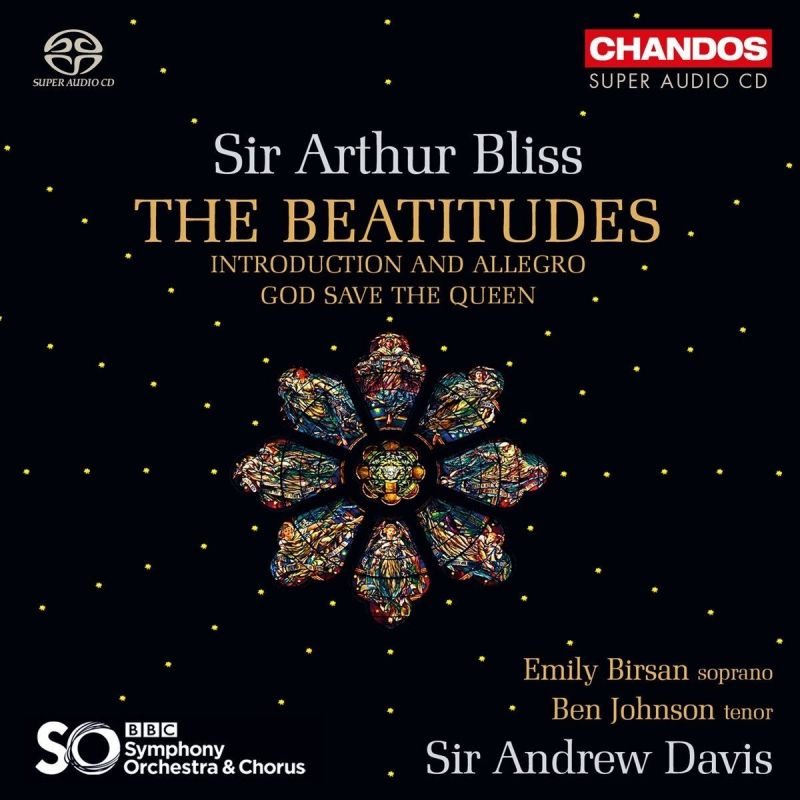BLISS The Beatitudes
View record and artist detailsRecord and Artist Details
Composer or Director: Arthur (Drummond) Bliss
Genre:
Vocal
Label: Chandos
Magazine Review Date: 03/2018
Media Format: Super Audio CD
Media Runtime: 66
Mastering:
DDD
Catalogue Number: CHSA5191

Tracks:
| Composition | Artist Credit |
|---|---|
| The Beatitudes |
Arthur (Drummond) Bliss, Composer
Andrew Davis, Conductor Arthur (Drummond) Bliss, Composer BBC Symphony Chorus BBC Symphony Orchestra Ben Johnson, Tenor Emily Birsan, Soprano |
| Introduction and Allegro |
Arthur (Drummond) Bliss, Composer
Andrew Davis, Conductor Arthur (Drummond) Bliss, Composer BBC Symphony Orchestra |
| God Save the Queen |
Arthur (Drummond) Bliss, Composer
Andrew Davis, Conductor Arthur (Drummond) Bliss, Composer BBC Symphony Chorus BBC Symphony Orchestra |
Author: Jeremy Dibble
A hybrid work, like its forbear Morning Heroes, it consists of the nine Beatitudes from the Gospel of Matthew, interspersed with an anthology of 17th-century poetry by Taylor, Vaughan and Herbert (some of which will be familiar from Vaughan Williams’s Five Mystical Songs), an adapted section from Isaiah and a poem by Dylan Thomas. Not only do these words provide a religious subtext but they also furnish a coherence to the Beatitudes themselves which otherwise, as the composer wisely adduced, might well have caused unnecessary monotony. Indeed, conversely, it is in the choruses of selected texts that the ‘meat’ of the work is to be found (for which the Beatitudes function, for the most part, as tranquil ‘intermezzos’). To hear Herbert’s ‘Easter’ and ‘I got me flowers’ (a beautiful elegy for soprano and chorus) in a quite different and poignant context is deeply moving. Bliss’s unusual style of choral writing, its preponderant homophony dependent so much on harmonic variety and textural variation, contrasts effectively as an instrument enveloped by the composer’s finely graded orchestration. Bliss’s affinity for strong marches emerges in ‘The lofty looks of man shall be humbled’ (Isaiah) and his ability to create moments of rapt beauty is striking in Herbert’s ‘The Call’, a part-song for chorus and orchestra. The orchestral Prelude and central Interlude remind us of the Bliss of Checkmate and Miracle in the Gorbals, an idiom where he excelled, and the Scherzo of this symphonic canvas is manifested in the angry setting of Thomas’s ‘And death shall have no dominion’. The final Beatitudes (5 8) form an exquisite foil to the violent orchestral Interlude but it is in the last part of the work, ‘The Voices of the Mob’ and the closing ‘Epilogue’ using Jeremy Taylor’s ‘O blessed Jesu’, more Passion-like in genre, that the composer is most powerfully eloquent.
Andrew Davis clearly has a peculiar empathy for this music and the clean edges of Bliss’s orchestral palette, complemented by some lovely playing from the BBC SO and the two soloists, Emily Birsan and Ben Johnson. This is also apparent in a most welcome recording of the virtuoso Introduction and Allegro, written for Stokowski (1926; rev 1937), a compelling mélange of serenity and contrapuntal tour de force which builds on the brilliance of the Colour Symphony of 1922.
Discover the world's largest classical music catalogue with Presto Music.

Gramophone Digital Club
- Digital Edition
- Digital Archive
- Reviews Database
- Full website access
From £8.75 / month
Subscribe
Gramophone Full Club
- Print Edition
- Digital Edition
- Digital Archive
- Reviews Database
- Full website access
From £11.00 / month
Subscribe
If you are a library, university or other organisation that would be interested in an institutional subscription to Gramophone please click here for further information.




